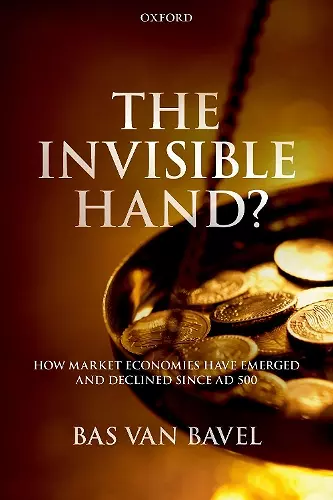The Invisible Hand?
How Market Economies have Emerged and Declined Since AD 500
Format:Paperback
Publisher:Oxford University Press
Published:29th Apr '19
Currently unavailable, and unfortunately no date known when it will be back
This paperback is available in another edition too:
- Hardback£59.00(9780199608133)

The Invisible Hand? offers a radical departure from the conventional wisdom of economists and economic historians, by showing that 'factor markets' and the economies dominated by them -- the market economies -- are not modern, but have existed at various times in the past. They rise, stagnate, and decline; and consist of very different combinations of institutions embedded in very different societies. These market economies create flexibility and high mobility in the exchange of land, labour, and capital, and initially they generate economic growth, although they also build on existing social structures, as well as existing exchange and allocation systems. The dynamism that results from the rise of factor markets leads to the rise of new market elites who accumulate land and capital, and use wage labour extensively to make their wealth profitable. In the long term, this creates social polarization and a decline of average welfare. As these new elites gradually translate their economic wealth into political leverage, it also creates institutional sclerosis, and finally makes these markets stagnate or decline again. This process is analysed across the three major, pre-industrial examples of successful market economies in western Eurasia: Iraq in the early Middle Ages, Italy in the high Middle Ages, and the Low Countries in the late Middle Ages and the early modern period, and then parallels drawn to England and the United States in the modern period. These areas successively saw a rapid rise of factor markets and the associated dynamism, followed by stagnation, which enables an in-depth investigation of the causes and results of this process.
Bas Van Bavel has given both public policy and comparative institutional history a great boost by asking big questions about where we are in the history of economic development, looking at contemporary quandaries through the lens of long-term historical patterns. * Hilton L. Root, Independent Review *
Starting from a sharp focus on fundamental problems -- the long-term effects of society on market economies, the management of catastrophes -- Bas van Bavel tests existing theories and clearly formulates his innovative insights. * Wim Blockmans, Emeritus professor of medieval history, Leiden University *
Bavel is excellent in providing numerical estimates... It is not only the plausibility of the mechanism of decline that gives strength to Bavel's thesis; it is also that he lists the manifestation of the decline * Branko Milanovic, globalinequality *
A brief review...cannot do justice to wealth of material in this important new book, other than by noting that anyone interested in these issues should not miss it. * Gene Callahan, Cardiff University, History: Reviews of New Books *
This a beautifully written book, easy to read, which makes it adequate for a wide audience. Above all, it is an original and intellectually challenging piece of scholarly work that breaks new historical grounds. Van Bavel is one of the few scholars alive who is equally an expert on history, economics, politics. This characteristic enables him a truly subtle analysis of texts and ideas. I want to make clear at the outset that economists and economic historians neglect this book at their peril, since it represents a methodological challenge to research as usual ... this book is going to be a vital contribution to the advancement of economic discourse as well as a crucial intervention in current political debate. * Stefano Zamagni, Journal of Economics *
Van Bavel's deep expertise in the subject matter weaves an intricate web of connections of cultural, economic, and social aspects across time and space, and seamlessly draws the reader into a wonderful account * Mauricio Drelichman, Journal of Economic Literature *
any social scientist interested in "big think" questions will benefit greatly from reading The Invisible Hand? While it presents only a piece of the "great divergence" puzzle, it is an understudied piece that is an important complement to existing theories based on institutions, culture, and governance. * Jared Rubin, EH.net *
- Winner of Winner of the NWO Spinoza Prize.
ISBN: 9780198820451
Dimensions: 233mm x 161mm x 18mm
Weight: 518g
352 pages